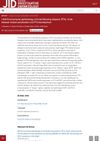 22 citations,
August 2011 in “Endocrine Practice”
22 citations,
August 2011 in “Endocrine Practice” Most hirsutism cases are due to PCOS, and treatment focuses on lowering testosterone and blocking its effects.
[object Object]  20 citations,
May 2020 in “Experimental Dermatology”
20 citations,
May 2020 in “Experimental Dermatology” Aging scalp skin contributes to hair aging and loss, and more research is needed to develop better hair loss treatments.
 13 citations,
September 2011 in “American Journal of Clinical Dermatology”
13 citations,
September 2011 in “American Journal of Clinical Dermatology” The oral contraceptive ethinylestradiol/chlormadinone acetate is effective in reducing acne and improving other skin conditions related to high androgen levels.
 7 citations,
December 2019 in “American Journal of Clinical Dermatology”
7 citations,
December 2019 in “American Journal of Clinical Dermatology” Topical therapies show promise for hair loss and acne treatment with minimal side effects.
 3 citations,
January 2001 in “Cambridge University Press eBooks”
3 citations,
January 2001 in “Cambridge University Press eBooks” Finasteride effectively treats hair loss and enlarged prostate in men, with mild side effects.
 1 citations,
January 2015 in “Hair therapy & transplantation”
1 citations,
January 2015 in “Hair therapy & transplantation” Some supplements and hormones can increase hair loss by raising DHT levels.
 1 citations,
November 2008 in “Gerontology”
1 citations,
November 2008 in “Gerontology” Older adults use lifestyle drugs to improve life quality and appearance, but caution is needed due to side effects and potential abuse.
 January 2015 in “Springer eBooks”
January 2015 in “Springer eBooks” Hormones affect skin aging, and treatments targeting hormonal balance may improve skin health.
 72 citations,
October 1998 in “Baillière's clinical endocrinology and metabolism”
72 citations,
October 1998 in “Baillière's clinical endocrinology and metabolism” Long-term testosterone therapy can cause hormone suppression, affect prostate and heart health, and alter physical characteristics, but does not increase prostate cancer risk and needs more research for full risk assessment.
[object Object]  22 citations,
November 2018 in “Breast Cancer Research and Treatment”
22 citations,
November 2018 in “Breast Cancer Research and Treatment” The medications 5α-reductase inhibitors and spironolactone are generally safe for breast cancer patients on endocrine therapies and do not significantly increase breast cancer risk.
 4 citations,
October 2007 in “Dermatologic Clinics”
4 citations,
October 2007 in “Dermatologic Clinics” Glucocorticoids and sex hormones affect skin health, with potential for targeted treatments to minimize side effects and treat skin conditions.
 August 2012 in “Pharmaceutical Medicine”
August 2012 in “Pharmaceutical Medicine” The document concludes that various medications and treatments can have significant, sometimes adverse, effects on health outcomes.
 9 citations,
March 2022 in “Frontiers in Endocrinology”
9 citations,
March 2022 in “Frontiers in Endocrinology” About 19.4% of Iranian women in the study have Polycystic Ovary Syndrome, with the most common type involving irregular periods and high male hormone levels, but their heart and metabolic health is similar to women without the condition.
 2 citations,
September 2021 in “JCPSP. Journal of the College of Physicians & Surgeons Pakistan”
2 citations,
September 2021 in “JCPSP. Journal of the College of Physicians & Surgeons Pakistan” Women with PCOS have thicker parafoveal areas in their retinas, but their macular blood vessel density is normal.
 November 2023 in “Indian Journal of Dermatology”
November 2023 in “Indian Journal of Dermatology” The study found that Frontal Fibrosing Alopecia in North-East India mainly affects middle-aged women and is often associated with lichen planus pigmentosus.
 47 citations,
September 2022 in “European Heart Journal”
47 citations,
September 2022 in “European Heart Journal” Women may need different blood pressure guidelines than men for heart disease prevention.
 1 citations,
June 2021 in “Journal of gynecology and womens health”
1 citations,
June 2021 in “Journal of gynecology and womens health” The study found that PCOS affects about 6.5-6.8% of women in both urban and rural areas of Telangana, India, and highlighted the importance of lifestyle changes for management.
May 2024 in “Journal of Fungi” Tinea capitis in adults, especially postmenopausal Black women, needs prompt treatment with oral antifungals to avoid scarring.
 19 citations,
November 2021 in “Reviews in endocrine and metabolic disorders”
19 citations,
November 2021 in “Reviews in endocrine and metabolic disorders” Sex hormones like estrogen and testosterone may affect COVID-19 severity differently in men and women, potentially influencing prevention and treatment strategies.
April 2019 in “Journal of Investigative Dermatology” Frontal Fibrosing Alopecia involves disrupted cholesterol pathways, fibrosis, and increased mast cells.
 131 citations,
September 2017 in “Molecular and Cellular Endocrinology”
131 citations,
September 2017 in “Molecular and Cellular Endocrinology” The document concludes that blocking the internal pathways that create androgens might help treat cancers that depend on sex hormones.
15 citations,
January 2015 in “Skin Appendage Disorders” Increased scalp sweating in frontal fibrosing alopecia may be linked to local skin inflammation.
 1 citations,
February 2017 in “Journal of gynecology and womens health”
1 citations,
February 2017 in “Journal of gynecology and womens health” The document concluded that more research is needed to understand how estrogen affects the enzyme involved in hirsutism development.

Thyroid problems can cause hair loss and change hair texture.
 January 2024 in “Authorea (Authorea)”
January 2024 in “Authorea (Authorea)” STK11 gene polymorphism does not predict metformin response in PCOS.
January 2020 in “Advances in Sexual Medicine” Female pattern hair loss does not significantly affect sexual dysfunction.
 2 citations,
May 2023 in “Current Nutrition Reports”
2 citations,
May 2023 in “Current Nutrition Reports” Eating a Mediterranean diet and taking certain supplements may improve symptoms of PCOS.
 April 2023 in “Journal of Investigative Dermatology”
April 2023 in “Journal of Investigative Dermatology” Being allergic to linalool, a common fragrance ingredient, might contribute to developing frontal fibrosing alopecia.
 3 citations,
January 2023 in “International Journal of Molecular Sciences”
3 citations,
January 2023 in “International Journal of Molecular Sciences” Heat Shock Proteins are important in the development of Polycystic Ovarian Syndrome and could be targets for new treatments.
2 citations,
July 2022 in “Frontiers in Medicine” Combining minoxidil with microneedling or spironolactone is more effective for female hair loss than using minoxidil alone.

























